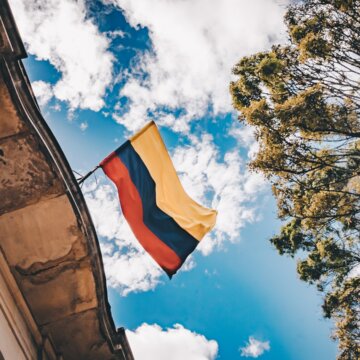- About
- Topics
- Picks
- Audio
- Story
- In-Depth
- Opinion
- News
- Donate
- Signup for our newsletterOur Editors' Best Picks.Send
Read, Debate: Engage.
| topic: | Election |
|---|---|
| located: | Colombia |
| editor: | Ellen Nemitz |
One week ahead of the presidential elections, Colombians have witnessed a much sought-after battle between right and left-wing candidates, as well as some violent events. On Sunday, 23 May, Francia Marquez Mina, a lawyer and defender of the environment and human rights running for vice-president by leftist Gustavo Petro's side, had to continue her last speech behind a bullet proof shield after being targeted by lasers, as social media videos prove.
The Senior Researcher of Americas Division at Human Rights Watch, Juan Papier, marked the oddness of the occurrence involving the vice-presidential candidate to "make a speech under escort and with bulletproof shields," as well as "police reports that there was a wiretap at a candidate's headquarters." He affirms that Colombia should not accept and normalise this abnormal situation. Expressing a similar opinion, the Director of Americas Division at Human Rights Watch, José Miguel Vivanco, called the closure of Marquez' campaign almost "invisible" due to the bullet proof shields, and that this "shows how much Colombia has regressed in security," which is "not normal in a 21st century democracy."
The meaning behind the violence is elucidated by specialists such as the professor at Universidad Nacional de Colombia and investigator at Centre for Law, Justice and Society Studies, Rodrigo Uprimny. In the article "Nuestra democracia está en peligro" (Our democracy is in danger), he compares the 2022 elections to two others in the past, in 1970 and 1990, to conclude that Colombia now lives the worst scenario of combining "a biassed government, like in 1970, in a context of growing violence, like in 1990." Moreover, Uprimny did not discard, on 22 May (one day before the attempt on Francia), the possibility of a violent event involving this coalition.
Meanwhile, Petro convened other candidates to be alert to a supposed fraud attempt to the upcoming elections - which could be cancelled or suspended, he said - although the current president, Ivan Duque, strongly denied any intention in doing so.
The Colombian people's decision on 29 May will revolve around three different government plans. According to the candidates’ official websites, Gustavo Petro claims four administration cores: change in women’s rights, economy for life, society for life and technology for life - with a strong focus on the environment. The right-wing Federico Gutiérrez, known simply as Fico, has focused his campaign on order (basically meaning tackling corruption) and economic opportunities for all. The outlier Rodolfo Hernández' slogan - "no stealing, no lying, no betraying" - is also a call for tackling corruption. Each candidate’s plans address other issues, naturally, but slogans may give us an important clue about their priorities.
In this violent and uncertain context, the surveys show Petro as one of the favourites to winning the first round on Sunday. Other candidates with real chances of getting to the runoff are Gutiérrez and the self-declared "king of Tik Tok,” Hernández. Ingrid Betancourt, who had been held captive by the FARC guerilla group for more than six years, gave up her candidacy to support Hernández. The most likely scenario for the second round, however, is actually a left-right dispute between Petro and Fico.
Photo by Flavia Carpio

